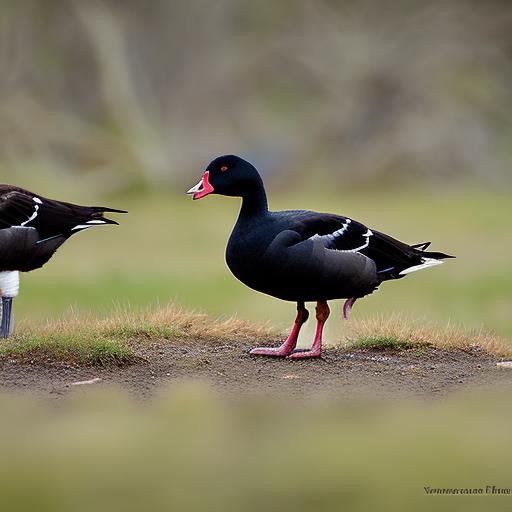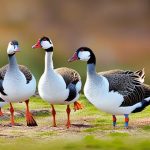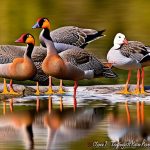The history of domestic black geese breeds dates back thousands of years, with evidence of their existence found in ancient Egyptian and Chinese writings. These geese were originally bred for their meat, eggs, and feathers, and were highly valued for their ability to thrive in a variety of climates and environments. Over time, different breeds of domestic black geese emerged, each with its own unique characteristics and traits. These geese were an important part of agricultural and domestic life in many cultures, and were often kept in small flocks by farmers and homesteaders.
In Europe, domestic black geese were particularly popular, with breeds such as the Toulouse and the Pomeranian becoming well-known for their size and meat production. These geese were often raised in large numbers on farms and were an important source of income for many families. In North America, domestic black geese were also widely kept, with breeds such as the African and the Embden becoming popular for their hardiness and adaptability to the harsh climate. Today, domestic black geese continue to be an important part of agriculture and conservation efforts, with many breeders working to preserve and promote these unique and valuable birds.
Characteristics and Physical Traits of Domestic Black Geese
Domestic black geese are known for their striking appearance and distinctive physical traits. They are typically large birds, with males weighing up to 20 pounds and females reaching around 15 pounds. Their plumage is usually a deep, glossy black, although some breeds may have white or gray markings on their feathers. Their beaks and legs are often orange or pink in color, and they have a regal and upright posture. Domestic black geese are also known for their strong and sturdy build, with broad chests and powerful wings that allow them to fly short distances.
In addition to their size and color, domestic black geese are also valued for their calm and gentle temperament. They are known for being good-natured and easy to handle, making them popular choices for small-scale farmers and homesteaders. These geese are also highly intelligent and social animals, often forming strong bonds with their human caretakers and other members of their flock. They are also excellent foragers, and can be raised on pasture or free-range environments, where they will happily graze on grass, weeds, and other vegetation. Overall, domestic black geese are prized for their combination of beauty, size, and gentle disposition, making them a valuable addition to any farm or homestead.
Popular Breeds of Domestic Black Geese
There are several popular breeds of domestic black geese, each with its own unique characteristics and traits. One of the most well-known breeds is the Toulouse, which originated in France and is prized for its large size and excellent meat production. These geese are known for their calm and friendly nature, and are often raised for both meat and exhibition purposes. Another popular breed is the African, which hails from the African continent and is known for its striking black plumage and upright posture. These geese are highly adaptable and hardy, making them a popular choice for small-scale farmers and homesteaders.
The Embden is another popular breed of domestic black geese, originating from Germany and known for its large size and white plumage. These geese are often raised for meat production and are valued for their calm and docile temperament. The Pomeranian is also a well-known breed, originating from the Pomerania region of Europe and prized for its striking black and white plumage. These geese are known for their friendly and sociable nature, and are often raised for both meat and exhibition purposes. Overall, there are many different breeds of domestic black geese to choose from, each with its own unique characteristics and traits that make them valuable additions to any farm or homestead.
Differences in Behavior and Temperament Among Domestic Black Geese Breeds
While domestic black geese share many common traits, there are also differences in behavior and temperament among different breeds. For example, the Toulouse is known for its calm and gentle nature, making it a popular choice for families and small-scale farmers. These geese are often friendly and sociable, and are known for forming strong bonds with their human caretakers. On the other hand, the African is known for its independent and hardy nature, and is often raised in free-range or pasture environments where it can forage and graze to its heart’s content.
The Embden is another breed known for its calm and docile temperament, making it a popular choice for those looking for a gentle and easy-to-handle goose. These geese are often raised in small flocks and are known for their friendly and sociable nature. The Pomeranian, on the other hand, is known for its lively and active temperament, and is often raised for exhibition and show purposes. These geese are highly sociable and enjoy interacting with their human caretakers, making them a popular choice for those looking for a more interactive and engaging breed. Overall, while domestic black geese share many common traits, there are also differences in behavior and temperament among different breeds, making it important for potential owners to choose a breed that best fits their needs and preferences.
The Importance of Domestic Black Geese in Agriculture and Conservation
Domestic black geese play an important role in agriculture and conservation efforts, providing valuable meat, eggs, and feathers, as well as contributing to the preservation of rare and endangered breeds. These geese are often raised in small flocks on farms and homesteads, where they provide a sustainable source of protein and income for many families. Their ability to thrive in a variety of climates and environments makes them a valuable addition to any farm, and their gentle and sociable nature makes them a popular choice for those looking for a friendly and easy-to-handle bird.
In addition to their agricultural importance, domestic black geese also play a crucial role in conservation efforts, particularly in preserving rare and endangered breeds. Many breeders and conservation organizations work tirelessly to promote and protect these unique and valuable birds, ensuring that they continue to thrive for future generations. By raising and breeding domestic black geese, these individuals are helping to preserve genetic diversity and prevent the loss of valuable traits and characteristics. Overall, domestic black geese are an important part of agriculture and conservation efforts, providing valuable resources and contributing to the preservation of rare and endangered breeds.
Breeding and Rearing Domestic Black Geese
Breeding and rearing domestic black geese requires careful planning and attention to detail, as well as a commitment to providing a safe and healthy environment for the birds. When breeding domestic black geese, it is important to choose healthy and well-matched breeding pairs, taking into consideration their size, color, and temperament. It is also important to provide a suitable nesting area for the geese, ensuring that they have a safe and comfortable place to lay and incubate their eggs. Once the eggs have hatched, it is important to provide the goslings with a warm and secure brooding area, as well as a balanced diet and plenty of fresh water.
Rearing domestic black geese requires patience and dedication, as well as a commitment to providing the birds with a safe and healthy environment. It is important to provide the goslings with plenty of space to roam and forage, as well as access to fresh water and a balanced diet. It is also important to handle the goslings regularly, helping them to become accustomed to human interaction and ensuring that they grow up to be friendly and sociable birds. Overall, breeding and rearing domestic black geese requires careful planning and attention to detail, as well as a commitment to providing the birds with a safe and healthy environment in which to thrive.
Challenges and Considerations for Raising Domestic Black Geese
Raising domestic black geese comes with its own set of challenges and considerations, particularly when it comes to providing a suitable environment and meeting the birds’ specific needs. One of the main challenges of raising domestic black geese is providing them with a safe and secure living environment, particularly if they are raised in a free-range or pasture setting. It is important to protect the geese from predators and provide them with adequate shelter and protection from the elements. Another challenge is providing the geese with a balanced diet and access to fresh water, particularly in areas with harsh climates or limited forage options.
Another consideration when raising domestic black geese is their social and interactive nature, as they thrive on companionship and human interaction. It is important to provide the geese with plenty of space to roam and forage, as well as regular handling and interaction with their human caretakers. Additionally, it is important to consider the specific needs and requirements of different breeds, as each breed may have its own unique traits and characteristics that need to be taken into account. Overall, raising domestic black geese requires careful planning and consideration of the birds’ specific needs and requirements, as well as a commitment to providing them with a safe and healthy environment in which to thrive.
The Role of Domestic Black Geese in Sustainable Farming Practices
Domestic black geese play an important role in sustainable farming practices, providing valuable resources and contributing to the overall health and productivity of the farm. These geese are often raised in small flocks on pasture or free-range environments, where they help to control weeds and pests, as well as fertilize the soil with their droppings. Their ability to forage and graze on a variety of vegetation makes them a valuable addition to any farm, particularly in areas with limited access to mechanical or chemical weed control methods.
In addition to their role in weed control and soil fertility, domestic black geese also provide a sustainable source of meat, eggs, and feathers, contributing to the overall self-sufficiency and resilience of the farm. By raising and breeding these geese, farmers are able to provide a valuable source of protein and income for their families, as well as contribute to the preservation of rare and endangered breeds. Overall, domestic black geese play an important role in sustainable farming practices, providing valuable resources and contributing to the overall health and productivity of the farm.
Black Geese in Different Cultures and Traditions
Domestic black geese have played an important role in many different cultures and traditions throughout history, particularly in Europe and Asia, where they were highly valued for their meat, eggs, and feathers. In many cultures, domestic black geese were a symbol of prosperity and abundance, and were often raised in large numbers on farms and homesteads. They were also an important part of many traditional dishes and recipes, particularly in Eastern European and Asian cuisines, where goose meat and eggs were highly prized for their rich flavor and nutritional value.
In addition to their culinary importance, domestic black geese were also an important part of many cultural and religious traditions, particularly in Europe, where they were often associated with fertility and rebirth. In many European countries, domestic black geese were a common sight at weddings and other celebrations, where they were often used as a symbol of good luck and prosperity. Today, domestic black geese continue to be an important part of many cultural and culinary traditions, particularly in Eastern Europe and Asia, where they are highly valued for their unique flavor and nutritional value.
Future Trends and Developments in Domestic Black Geese Breeding and Conservation
The future of domestic black geese breeding and conservation looks promising, with many breeders and conservation organizations working tirelessly to promote and protect these unique and valuable birds. There is a growing interest in rare and heritage breeds of domestic black geese, particularly in North America, where many breeders are working to preserve and promote these unique and valuable birds. There is also a growing interest in sustainable and regenerative farming practices, with many farmers and homesteaders looking to incorporate domestic black geese into their operations as a way to control weeds and pests, as well as provide a sustainable source of meat, eggs, and feathers.
In addition to their agricultural importance, domestic black geese are also becoming increasingly popular as pets and exhibition birds, particularly in urban and suburban areas where they are valued for their beauty and gentle nature. There is also a growing interest in using domestic black geese for conservation and land management purposes, particularly in areas with sensitive ecosystems or endangered species. Overall, the future of domestic black geese breeding and conservation looks promising, with many exciting developments and trends on the horizon.
Meet Walter, the feathered-friend fanatic of Florida! Nestled in the sunshine state, Walter struts through life with his feathered companions, clucking his way to happiness. With a coop that’s fancier than a five-star hotel, he’s the Don Juan of the chicken world. When he’s not teaching his hens to do the cha-cha, you’ll find him in a heated debate with his prized rooster, Sir Clucks-a-Lot. Walter’s poultry passion is no yolk; he’s the sunny-side-up guy you never knew you needed in your flock of friends!







